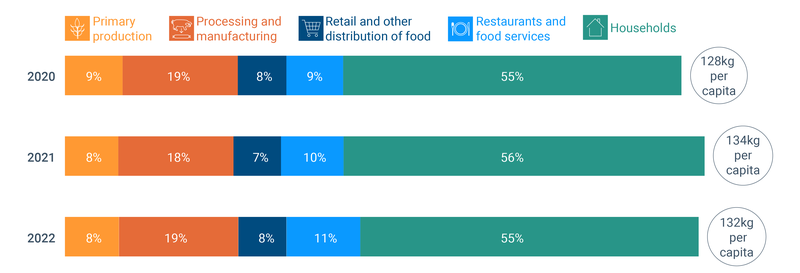All official European Union website addresses are in the europa.eu domain.
See all EU institutions and bodiesWhile prevention measures are gaining momentum, more effective efforts at national level are needed to tackle the huge problem of food waste according to a European Environment Agency (EEA) report released today. The assessment gives an update on waste prevention measures across the EU. Preventing food waste is both urgent and necessary, given the high impacts of food waste on climate change, but also to protect biodiversity, reduce pollution and enhance food security, it says.
Approximately 132 kilograms of food waste per person was generated across the European Union in 2022 amounting to just over 59 million tonnes of food waste and the environmental and economic impacts are high, according to the EEA report 'Preventing waste in Europe — Progress and challenges, with a focus on food waste’. The assessment gives the latest bi-annual check-up on waste prevention actions via data and trends the EEA does in support of EU’s Waste Framework Directive.
More evidence-based measures needed
EU Member States have taken action to prevent food waste, investing in monitoring and awareness and education campaigns. The use of regulatory measures or market-based measures, such as subsidies and financial incentives to prevent food waste, remains limited. To accelerate progress, better understanding of prevention actions’ effectiveness and tracking of progress is needed, the EEA report says.
To accelerate progress, the EU is close to adopting two binding food waste reduction targets to be achieved by EU Member States in 2030. These include a 10% food waste reduction in processing and manufacturing and a 30% per capita reduction at retail and consumer levels.
The report also stresses that waste prevention strategies should be better integrated in climate and biodiversity policies and measures, arguing that reducing food waste can reduce greenhouse gas emissions, as well as land, water and materials used in producing food.
Member States should also follow guidance from the so-called 'food use hierarchy,’ which stresses more efficient use and reuse of food products. For instance, surplus food should be donated or processed into animal feed instead of being recycled.
Food waste impacts
Food waste remains stubbornly high and has been difficult to reduce or prevent across the entire food system chain — from production, to processing and manufacturing to retail, food services and households, which suggests that prevention measures need to be stepped up, the report says.
Food waste accounts for around 16% of total greenhouse gas emissions from the EU’s food system. According to the European Commission, economic losses are estimated at €132 billion per year due to food being thrown out. Wasting food means that all the resources needed for its production, such as soil, water and energy, are also wasted.
Additionally, it means that the environmental burden of food production — such as the high input of chemical pesticides required to ensure stable food output and efficient production — is even more problematic, as these harmful impacts on soil, water and air occur without the food ever being used. Uneaten food also unnecessarily threatens biodiversity. Agriculture, driven by unsustainable food production practices, remains the leading cause of biodiversity loss, endangering thousands of species.

Food waste 2020-2022 in percentage and kg per capita within EU-27 (based on Eurostat data 2024)
Other key findings on total waste
Between 2010 and 2022, the amount of total waste generated in the EU increased, but considerably less than the economy. More specifically, the amount of waste generated divided by the EU′s economic output declined by 13%, with most of the reduction taking place between 2020 and 2022.
While reductions in combustion waste are closely linked to declining fossil fuel use, decoupling is most evident in the manufacturing and service industries. In contrast, waste generation in the waste and water sectors continues to rise regardless of economic trends. Further analysis is needed to understand the sector-specific drivers behind these trends.
The largest reductions in waste generation have primarily been driven by factors such as the COVID-19 pandemic and climate policy measures—rather than specific actions aimed at waste prevention.
Background
Waste prevention is central to the circular economy and plays a critical role in addressing climate change, biodiversity loss and pollution. It helps reduce resource extraction, manufacturing and transportation, and lowers carbon emissions. Because of this, waste prevention protects natural ecosystems and enhances the EU’s strategic autonomy and materials supply security.
The EU’s Waste Framework Directive prioritises waste prevention as the most effective strategy for reducing environmental impacts and improving resource efficiency. It mandates Member States to implement waste prevention programmes. These programmes promote sustainable consumption, improve product design and reduce the use of harmful substances. A key objective is to decouple economic growth from waste generation.
Under the Directive, the EEA is mandated to evaluate EU waste prevention policies and to assess policy implementation and waste generation trends as well as progress towards decoupling waste from economic growth and advancing a circular economy.
More information
- Updated Country profiles on waste prevention - 2025
- New Circularity Metrics Lab module on waste prevention
- Underpinning report by the EEA’s European Topic Centre
